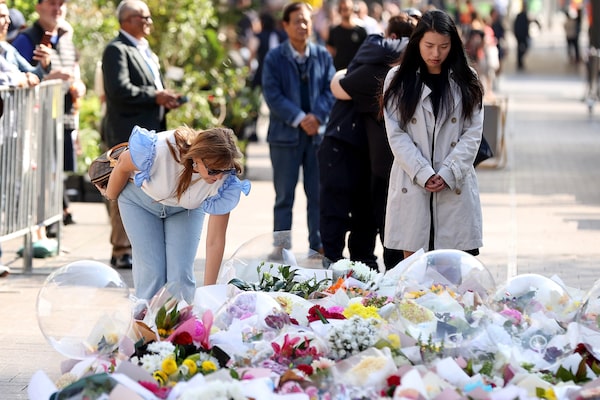
People lay flowers outside Westfield Shopping mall on April 16, in Bondi Junction, Australia, in honour of the victims of a stabbing attack at the shopping centre on April 13.Brendon Thorne/Getty Images
The knife attack in Australia on Saturday made headlines because of the number of victims and the very public location – a shopping mall in a country where mass killings are unusual, compared to other places. Of the six people killed during the attack in the Sydney beach suburb of Bondi, five were women, including a mother holding her nine-month-old daughter (the baby remains in hospital). The sixth was a security guard.
Police are investigating why the male attacker targeted women while avoiding men. “It’s obvious to me, it’s obvious to detectives that it seems to be an area of interest that the offender focused on women and avoided the men,” New South Wales Police Commissioner Karen Webb said.
The killer’s parents have revealed that he had schizophrenia and had stopped taking his medication. And they said they knew why he targeted women: “Because he wanted a girlfriend and he has no social skills,” his father, Andrew Cauchi, said. It was reminiscent of a 2018 attack in Toronto, where a man in a rented van deliberately killed 10 people and seriously injured another 16. He said he wished he had hit more women. It was the first time many of us ever heard the word “incel” – or “involuntary celibate.”
While these public incidents of femicide make headlines for their scale and locations, women remain targets of murder at an alarming rate. But somehow there is a perception that “domestic violence” or “intimate partner violence” is less newsworthy, less urgent.
It is extremely urgent.
Police in Australia said they’ve ruled out “terrorism.” Meanwhile, another stabbing there this week – at a church, where a 16-year-old male injured a bishop and several worshippers – has been designated a terror incident. In a video, the alleged perpetrator of the church stabbing can be heard saying: “If he [the bishop] didn’t get himself involved in my religion, if he hadn’t spoken about my prophet, I wouldn’t have come here.” Femicide also targets specific victims and instills terror.
It is a global epidemic. In Kosovo, five days after a man was arrested in the killing of his wife, police there arrested another man on suspicion of murdering his ex-wife. President Vjosa Osmani declared Wednesday a day of mourning in remembrance of all women and girls murdered in Kosovo because of gender-based violence. “But our society will mourn every day as long as our women and girls are being murdered,” she wrote.
Statistics Canada reported that in 2019, while just over half (53 per cent) of victims of police-reported violence in Canada were female, “the large majority (79 per cent) of victims of intimate partner violence were women, and this held true regardless of the type of intimate partner relationship. Nearly half (45 per cent) of all female victims of violence were victimized by an intimate partner.”
Between 2014 and 2019, 497 people in Canada were killed in an intimate partner homicide; 80 per cent of the victims were female. Twenty-one per cent of intimate-partner homicide victims in that period were Indigenous women, even though they make up only about five per cent of the female population in Canada.
In B.C., this is the Prevention of Violence Against Women Week. Also this week, a Burnaby, B.C., man was charged with the second-degree murder of a Vancouver woman. Investigators have determined that the victim and the accused knew each other.
We need more than an awareness week. We need year-round meaningful change, tougher laws and education – starting early. Teaching respect – of others and oneself – is certainly at least as important as teaching young people sigma notation or how to sew an apron.
These murders don’t happen in a vacuum. They happen in a culture that is still – and is increasingly – hostile to women.
South of the border, reproductive rights are disappearing. A former U.S. president – who has spoken in horrifically misogynistic terms about women – is currently on trial for paying hush money to an adult film star prior to the 2016 presidential election. And he could win the next one later this year.
Women are subjected to all kinds of everyday sexism, from our smaller paycheques to the much skimpier track-and-field uniforms designed for this year’s female U.S. Olympians. Beyond the dark web, women are openly harassed on social media, and elsewhere. This being a family publication, I can’t share some of the sexist language that peppers my inbox.
It is somehow still perceived, by some, as okay to speak to and about women in these ways. This creates a culture of continuing to see women as less-than – and worse.
 Marsha Lederman
Marsha Lederman